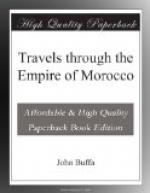Another ostensible cause of the dereliction of the peasantry from the laws of humanity, may be the extreme oppression under which they groan; as, on account of their former propensity to rebellion, they are now ruled with a rod of iron, which in all probability has rendered them callous, and deaf to the voice of nature. But, independently of these occasional depredations, there is a band of vagrants, who are actuated by no other motives, than what their own black hearts suggest. They inhabit caves in the sides of enormous rocky precipices, and go entirely naked: their principal food is the flesh of wild beasts. This tribe of freebooters appears to be quite a distinct set of people; they seem to have an invincible aversion to the Mahometan religion, and worship the sun and fire; they speak a different language from the rest of the inhabitants, a mixture of African and the old Arabic; all which circumstances favour their own report of themselves, which is, that they are the genuine descendants of the original inhabitants. They look down upon the more civilized Moors with contempt, and consider them as the real usurpers of their country, and the plunderers of their property. They subsist chiefly by rapine, and frequently throw a whole village into consternation by their nocturnal visits; yet their cunning and dexterity are so great, that they almost constantly elude the vigilance of justice: indeed, they are never forced from their places of retreat (which are inaccessible to all but themselves), but when taken, it is either in the act of robbing, or when they venture to the markets or fairs; and then the capture is not effected without a strong body of the military.
I was much disappointed on my arrival at Morocco with the appearance of the place; for, instead of finding it, as I expected, superior to Fez and Mequinez, I found it a large ruinous town, almost without inhabitants. It contains, indeed, a great many mosques, caravanseras, public baths, marketplaces or squares, and palaces of the Xeriffes, but all in almost deplorable state of ruin. Not many years since, this city was the Imperial residence, and contained six hundred and fifty thousand inhabitants; but the late civil wars, and the plague, which raged with such violence, in the beginning of the present Emperor’s reign, nearly depopulated it. In consequence of the latter melancholy event, the court was removed to Fez and Mequinez. To this account we may place the present desolate appearance of Morocco. The Imperial palace is, however, kept in repair, as the Emperor goes to Morocco annually to spend the fast-days, which are during the months of October and November; scarcely one fourth of the other palaces and houses are inhabited; but though this city now exhibits evident symptoms of rapid decay, we may still form a just idea of its former grandeur and magnificence.
The plain of Morocco is bounded by that long ridge of mountains called Atlas, which screen the town from the scorching heat of the easterly winds, while the snow, with which their summits are covered, renders the climate more temperate than in other parts of Barbary. Notwithstanding the salubrity of the climate of Morocco, a residence there is rendered miserable, by the multitudes of scorpions, serpents, gnats, and bugs, which infest the town and its neighbourhood.




